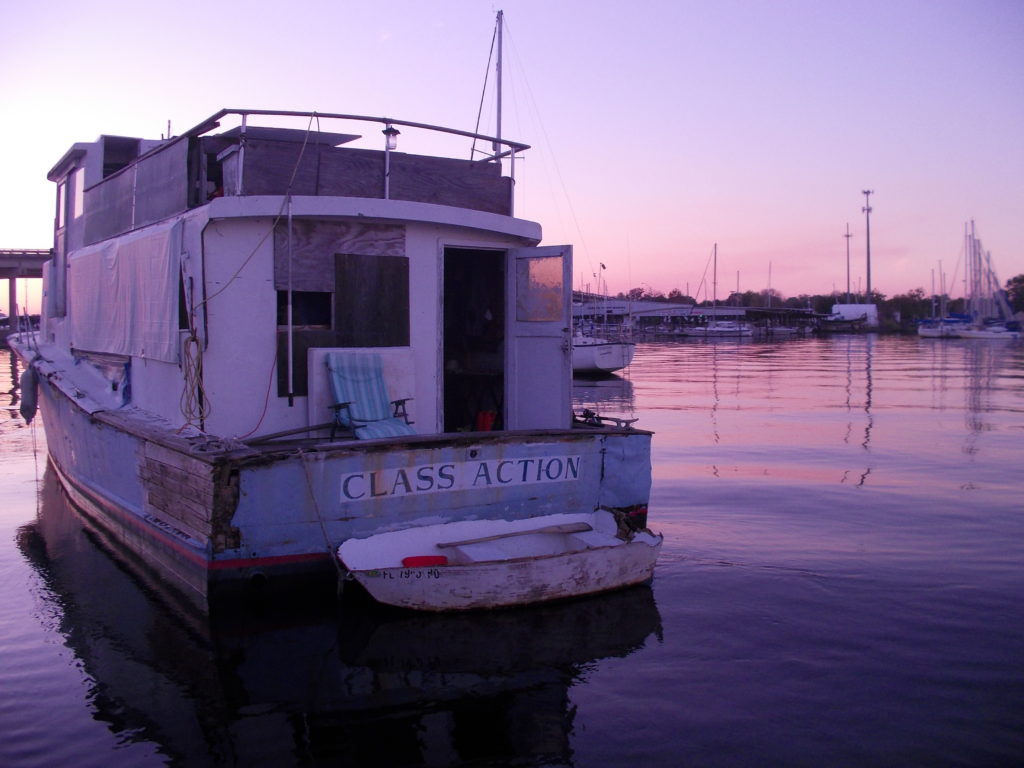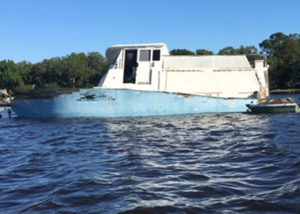Jacksonville, FL — Two winters ago, a battered-looking boat showed up in the Ortega River just east of the Highway 17 Bridge. Its wooden hull appeared worn through in places. Rotted wood on the cabin had been patched with plywood and duct tape. The faded paint still showed the boat’s name, Class Action.
There are several marinas and boat yards on the north bank of the river, but Class Action anchored on the south bank, the residential side. The generator that ran around-the-clock indicated that someone was living on the boat.

“He anchored less than 100 feet off my dock,” said Mike Barker, a resident who’s lived on the river for decades.
“He was right in front of our bedroom window,” said Barker’s wife, Sue. “I’m sure he didn’t mean that, but it was kind of creepy.”
The generator was so loud it kept the family awake at night, so Barker called the Florida Fish and Wildlife Commission (FWC).
Barker was told the owner of the boat had been on his way south to Green Cove Springs to salvage it, but had run into mechanical problems. So he anchored in the Ortega River, planning to live on the boat while repairing it, and later continue on.
Class Action eventually moved away from the Barker’s dock so the noise no longer bothered them. But for the next 18 months, it never moved again. Its windows and back door were blacked out so the interior couldn’t be seen, not even interior lights at night. The owner was rarely seen, except to go ashore in a small dinghy. On sunny days, even when the river was full of kayaks, paddle boarders, jet skis, and a steady stream of boat traffic headed out into the St. Johns River, the only sign the boat was occupied was a back door open to a completely dark cabin and a dinghy tied to the transom.
Last Thursday, under blue skies and calm waters, the Class Action sank.
Living on a boat, choosing where to anchor, maintaining it – there’s a lot of leeway under current Florida law, thanks in part to boaters associations who’ve worked to make the state’s waters more accessible to over-nighters and people who live on their boats full-time.
Local governments aren’t allowed to regulate the anchoring of vessels except in defined mooring fields, of which there are only a few in a pilot program in parts of the state that have experienced problems, like Miami, the Keys, and St. Augustine.
But this year, the Florida legislature passed new boating laws in response to complaints from around the state. The new laws may give authorities and property owners more control over who docks where and for how long.
The new laws haven’t taken effect yet, so the immediate question is: who’ll foot the thousands of dollars it will take to raise and salvage Class Action – the owner or the taxpayers? And what of the fuel, oil, and sewage that’s potentially been submerged for a week now?
“There is no fuel leakage,” said Capt. Biagio Angiuli, who is handling the case for FWC. “If there was fuel leaking, there would be a sheen on the surface of the water, and there isn’t. We are confident it didn’t have fuel aboard.”

FWC inspected the sunken boat on Tuesday, and were told by the owner that he’s trying to raise the boat himself with pumps.
“If a boat owner is actively trying to do the right thing, we give them the chance,” said Angiuli, adding that in this case, though, raising it would be “a difficult task.”
As for the sewage, he wasn’t sure. He declined to comment further due to the ongoing investigation.
Jim Suber, Waterways Coordinator and Dockmaster for the City of Jacksonville, said sewage disposal varies by boat. A boat with restroom facilities will usually have a storage tank that has to be pumped out at a marina when it’s full. Since the size of the tanks can vary, there’s no way of saying how often a boat that has someone living full-time on it would need to empty its tank. But since Class Action didn’t move for at least a year and a half, it’s not likely the sewage tanks were pumped out.
“All you can do is hope people are conscious of the health of the waterway,” he said. “Unfortunately, that’s not always a reality.”
Suber was aware of the sinking and said the city, the Jacksonville Sheriff’s Office Marine Patrol, and the FWC all communicate closely over problems with vessels.
Current law requires a boat to be classified as “derelict” before law enforcement can take action to remove it.
“An ugly boat is not necessarily a derelict boat,” said Suber. If a boat has propulsion under its own power, it’s not considered derelict, but that may be changing with new laws.
He said once law enforcement determines a vessel is abandoned or derelict, the city gets involved to locate grant money to raise and salvage it.
The average cost to local governments to remove a derelict vessel was $3,533 per vessel, according to the Summary Analysis of House Bill 7025. The bill was passed this year to broaden the definition of a derelict vessel, and give the FWC more authority to require vessel owners to maintain their vessels. It will take effect July 1.
The report also said the cost depends on the size of the boat, and can be $350 – $450 per foot of vessel length. Based on those figures, a 50 foot boat like the Class Action could cost $20,000 to raise and salvage.
Brooks Busey, owner of Sadler Marina on the north bank of the river, said he used to tow abandoned boats that sank near his marina, but there’s too much liability.
“If a boat rolls and spills its fuel while I’m trying to tow it, I don’t want to get charged for the accident,” he said. Also, he’s towed and cleaned up boats in the past only to have to owners show up and claim the boat, sometimes stiffing him on the bill.
Florida has no vessel salvage rights, according to FWC’s website. A vessel must be reported to law enforcement and then an individual can file a found property claim. But there’s no guarantee of completing it before an owner shows up.
Busey said older, wooden hulls like Class Action’s require proper upkeep – especially to ward against teredo worms. He recommends boats be hauled twice annually for maintenance. He said once they’re off schedule, Sadler won’t work on them in case they end up with an owner who can’t pay and whose insurance has lapsed. He’s been stuck before with the work cost plus a salvage bill.
“Been there, done that, never again,” he said.
Busey said he was aware of Class Action and had the impression it was in bad shape, but was never approached by the owner for any work.
As of Wednesday, the FWC made the decision to pursue the boat as a derelict vessel “after having given the owner time to rectify the situation personally,” said Capt. Angiuli in an email. This likely means salvage costs will fall on taxpayers.
The boat owner has not been reached at this time for comment. The article will be updated to reflect new information as received.
To report a navigational hazard, call the Coast Guard at 1 (800) 424-8802. To report an abandoned or derelict vessel, call either the Jacksonville Sheriff’s Office Marine Patrol at 1 (904) 630-0797, or Florida Fish and Wildlife Conservation Commission’s dispatch number at 1 (904) 359-3883.

